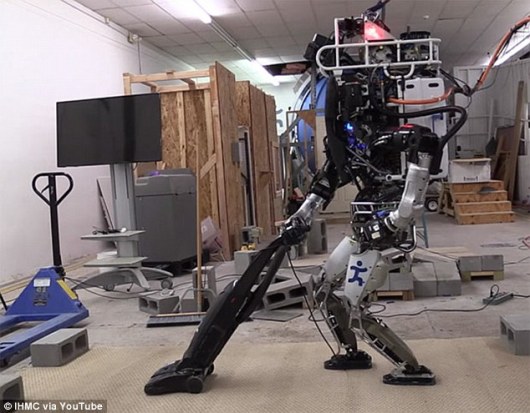Having completed my domestic labors for the day (including a turn around the house with my lovely red Miele), I take a moment to consider the most recent development from Boston Dynamics (now part of the robotics initiative at sea in Google’s Alphabet soup). More specifically, the news is of the latest incarnation of Boston Dynamic’s bipedal robot, nicknamed Atlas and famous for its distribution as a platform for DARPA’s Robotics Challenges. Previously figured as life-saving first responder and life-destroying robot soldier, Atlas is now being repositioned – tongue firmly in cheek – as a member of the domestic workforce.
While irony operates effectively to distance its author from serious investment in truth claims or moral positioning, irony also generally offers a glimpse into its stance towards its objects. So at the risk of humorlessness, it’s worth reading this latest rendering of Atlas’ promises seriously, in the context of other recent developments in humanoid robotics. I wrote in a former post about the U.S. military’s abandonment of Boston Dynamic’s Big Dog and its kin, attributed by commentators to some combination of disappointment in the robot’s performance in the field, and a move toward disinvestment in military applications on the part of Google’s ‘Replicant’ initiative (recently restructured as the ‘X’ group). This leaves a robot solution in search of its problem, and where better to turn than to the last stronghold against automation; that is, the home. Along with the work of care (another favourite for robotics prognosticators), domestic labor (the wonders of dish and clotheswashing machines notwithstanding) has proven remarkably resistant to automation (remarkable at least to roboticists, if not to those of us well versed in this work’s practical contingencies). In a piece headlined ‘Multimillion dollar humanoid robot doesn’t make for a good cleaner,’ the Guardian reproduces a video clip (produced in fast motion with upbeat technomusic soundtrack) showing Florida’s Institute for Human and Machine Cognition (IHMC), runner up in the 2015 Robotics Challenge, testing new code ‘by getting the multimillion dollar Atlas robot to do household chores.’ In an interesting inversion, the robot is described as the ‘Google-developed US government Atlas robot,’ a formulation which sounds as though the development path went from industry to the public sector, rather than the other way around.
Housework, we’re told, proves ‘more difficult than you might imagine,’ suggesting that the reader imagined by the Guardian is one unfamiliar with the actual exigencies of domestic work (while for other readers those difficulties are easily imaginable). The challenge of housework is revealing of the conditions required for effective automation, and their absence in particular forms of labor. Specifically, robots work well just to the extent that their environments – basically the stimuli that they have to process, and the conditions for an appropriate response – can be engineered to fit their capacities. The factory assembly line has, in this respect, been made into the robot’s home. Domestic spaces, in contrast, and the practicalities of work within them (not least the work of care) are characterized by a level of contingency that has so far flummoxed attempts at automation beyond the kinds of appliances that can either depend on human peripherals to set up their conditions of operation (think loading the dishwasher), or can operate successfully through repetitive, random motion (think Roomba and its clones). Long underestimated in the value chain of labor, robotics for domestic work might just teach us some lessons about the extraordinary complexity of even the most ordinary human activities.
Meanwhile in Davos the captains of multinational finance and industry and their advisors are gathered to contemplate the always-imminent tsunami of automation, including artificial intelligence and humanoid robots, that is predicted to sweep world economies in the coming decades. The Chicago Tribune reports:
At IBM, researchers are working to build products atop the Watson computing platform – best known for its skill answering questions on the television quiz show “Jeopardy” – that will search for job candidates, analyze academic research or even help oncologists make better treatment decisions. Such revolutionary technology is the only way to solve “the big problems” like climate change and disease, while also making plenty of ordinary workers more productive and better at their jobs, according to Guru Banavar, IBM’s vice president for cognitive computing. “Fundamentally,” Banavar said, “people have to get comfortable using these machines that are learning and reasoning.” [SIC]
Missing between the lines of the reports from and around Davos are the persistent gaps between the rhetoric of AI and robotics, and the realities. These gaps mean that the progress of automation will be more one of degradation of labor than its replication, so that those who lose their jobs will be accompanied by those forced to adjust to the limits and rigidities of automated service provision. The threat, in other words, is not that any job can be automated, as the gurus assert, but rather that in a political economy based on maximizing profitability for the few, more and more jobs will be transformed into jobs that can be automated, regardless of what is lost. Let us hope that in this economy, low and no wage jobs, like care provision and housework, might show a path to resistance.

